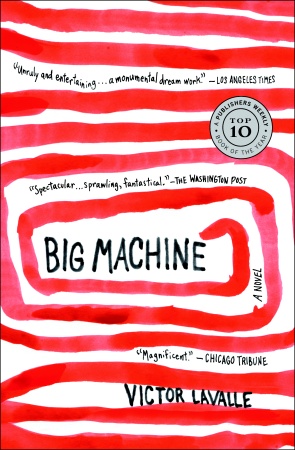Victor LaValle: Big Machine
"Make peace with a little mystery," suggests Ricky Rice, protagonist of Victor LaValle’s newest novel, Big Machine. Rice is a bus-stop janitor with a shadowy past and a mostly-kicked junk habit, and he gives himself this advice in response to receiving a cryptic envelope with a Greyhound ticket and a post-it note: "You made a promise in Cedar Rapids in 2002. Time to honor it."
The ticket takes Rice up to a cabin in the mountains of Vermont, where he slated to perform some nebulous task amid a band of equally confused colleagues—all African-Americans, all with histories as criminally unfortunate as Rice’s own. His cohort turns out to be recruits for a team of "spiritual X-Men" known as the Unlikely Scholars, and tasked with researching paranormal happenings from an endless supply of newspaper clippings retained at the nearby Washburn Library.
The library’s founder, Judah Washburn, was a blind runaway slave who fled to the California wilderness, where a celestial Voice spoke to him, guiding him not only towards spiritual revelation but also a hidden cache of gold—the fortune upon which the library was founded, for purposes both scholastic and spiritual; the Unlikely Scholar’s research is meant to limn the presence of The Voice in contemporary America, to reconnect to whatever divine truth Judah Washburn realized in those California hinterlands some two-hundred years ago.
Though LaValle earnestly excavates notions of spiritual truth through this plot, the text itself never feels heavy-handed or moralizing. For every moment that sinks the reader further into the darkness of a vividly-realized fallen world, LaValle counters with frequent buoys of humor, such as the tailors who outfit the Scholars like outrageous fetishists of nineteenth-century dandyism, or Ricky’s characterization of his research as "a pseudoscience, like phrenology or investment banking." And the novel works to subvert traditions of faith as much as it does to affirm them. The Voice could function just as easily as a reference to Jehovah’s burning bush as it could be a phenomenon investigated in The X-Files. LaValle evokes several lenses through which readers can peer at the inexplicable, but he offers no solutions—after all, the attempt would be futile anyway. Instead, it is the struggle itself that counts.
This is true for LaValle’s characters, too, who are universally in need of redemption. The women of the Unlikely Scholars are former prostitutes and identity-thieves, and Ricky Rice himself is the sole survivor of a cult-suicide that took the lives of his childhood friends and family in a tragic scene that echoes the Jonestown massacre or the FBI siege of the Branch Davidians in Waco. LaValle’s fictional cult is an ostensibly Christian sect called the Washerwomen, led by three southern belles who murdered their husbands and fled north to spread a re-written gospel: "the Washerwomen’s version of the Bible didn’t take place in towns like Jericho or Judea. Instead the Israelites escaped out of Georgia and Tennessee. And… they weren’t even called Israelites. There were called Negroes."
Even as Ricky struggles with survivor’s guilt and his complicity in his sister’s death, he retains fond memories of his familial time with the Washerwomen. While they are responsible for ruining his life, they are also responsible for shaping the beliefs that give meaning to everything he knows. LaValle seems to suggest that faith is a necessity to survive in a world of doubt—indeed, the book is named for it: "Doubt is the big machine. It grinds up the delusions of women and men." And doubt seems to be a common ground for the struggles of race and religion that intersect at the heart of the novel.
The struggles continue in surreal and through-provoking ways as Ricky Rice’s journey takes him across the country to investigate a clandestine threat to the Washburnites in the form of a renegade former-Scholar accompanied by a hoard of homeless-men-turned-suicide-bombers and mysterious beings that could be angels or devils. The journey takes Rice, too, further into his own past, where he is pitted against the demons of his own bad decisions, their consequences stacked up for years upon years. LaValle’s protagonist is a character of emotional complexity, and as the action picks up, so do the depths of readers’ compassion and contemplation.
However, Rice’s adage to make peace with mystery turns out to be good advice for the reader, too—much of the book’s mystery is engaging, but occasionally it becomes frustrating when LaValle’s technique of withholding information goes too far. I was sometimes unable to find any immediate purpose for such obfuscation; instead of increased tension or mystery, it produces disorientation. It doesn’t help that the book is a structural nightmare: a convolution of flashbacks, digressions, strangely-contrived shifts in point of view, and frustratingly-frequent alternations between past and present plotlines that, rather than keeping readers engaged in both, serves only to keep us from getting relentlessly immersed in either one.
But despite these flaws, LaValle’s novel is ultimately a great read—a beautiful mash-up of horror and crime-noir tropes with literary accomplishment, and a thought-provoking agitator of American perspectives on race and religion. Have you been hearing voices from the nether-realms? They’re probably telling you to read Big Machine.
 Victor LaValle
Victor LaValle